Join a community of readers who are committed to Jewish stories
Sign up for JBC’s Nu Reads, a curated selection of Jewish books delivered straight to your door!
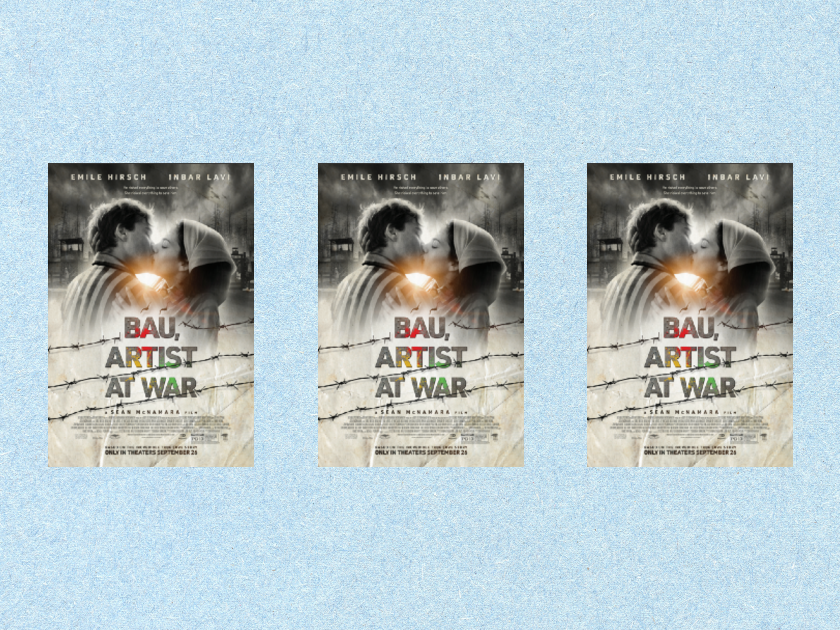
JBC spoke with Clila Bau-Cohen and Hadasa Bau about their parents, Joseph and Rebecca Bau, in light of the republication of their father’s memoir, Bau: Artist at War, and the release of the film adaptation of this couple’s powerful story of survival and love during the Holocaust.
Bau, Artist at War comes to theaters for a limited run this September. Special showings begin September 25th, with the nationwide release on September 26th. Tickets go on sale September 17th. Don’t miss this powerful story of courage, love, and resilience. Visit baumovie.com to watch the trailers, learn more, and secure your tickets starting September 17.
Simona Zaretsky: Clila and Hadasa, it seems like you had an incredible connection with both of your kind, loving, and courageous parents. What was it like seeing the stories you’d heard about — or read — all your lives, translated into film?
Clila Bau-Cohen and Hadasa Bau: Watching the feature film Bau, Artist at War, which tells the incredible love story of our parents during the Holocaust, was an amazing experience for us. This is a must-see movie!
We grew up hearing these stories from our parents. To see them brought to life on screen — our father’s heroism as Schindler’s forger, our mother’s courage, and even their wedding in the Płaszów concentration camp — was overwhelming. For us, it was like watching our family history illuminated for the world. It was emotional, but also a gift, because now future generations can experience their story with the same depth and humanity we did.
Our parents always told us that “there must be a movie about us so all the world should learn from us to love, to laugh, and be happy like us.” Our father actually painted a movie poster for his memoir, captioned “Love in the camp: An unforgettable story and winner of 10 Oscars.”
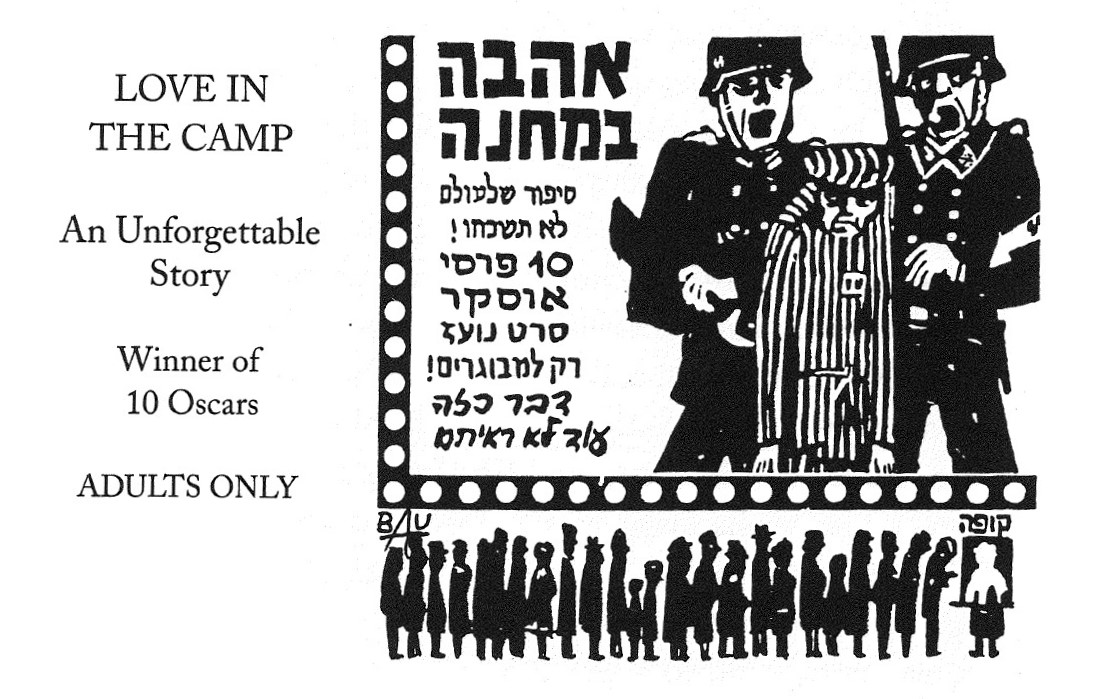
SZ: Your father was such a talented and prolific artist. His work is powerfully featured in the memoir Bau: Artist at War. How was his visual work incorporated into the movie?
CV and HB: Our father’s art is woven throughout the film. The movie doesn’t just tell his story — it also shows the way he saw the world. His drawings and a replication of his art studio with the Hebrew fonts he designed appear in the film. The filmmakers used his artistic vision as a bridge between past and present, darkness and light. In a way, his art became another character in the film, reminding viewers that creativity can be an act of resistance and survival.
For example, our father created a painting titled “Bread is the Idol” showing eight people looking with hungry eyes at a loaf of bread, trying to reach it, but unable to. The film uses an animated version of this painting to introduce the next scene where you see eight camp prisoners (actors) trying to reach the bread.
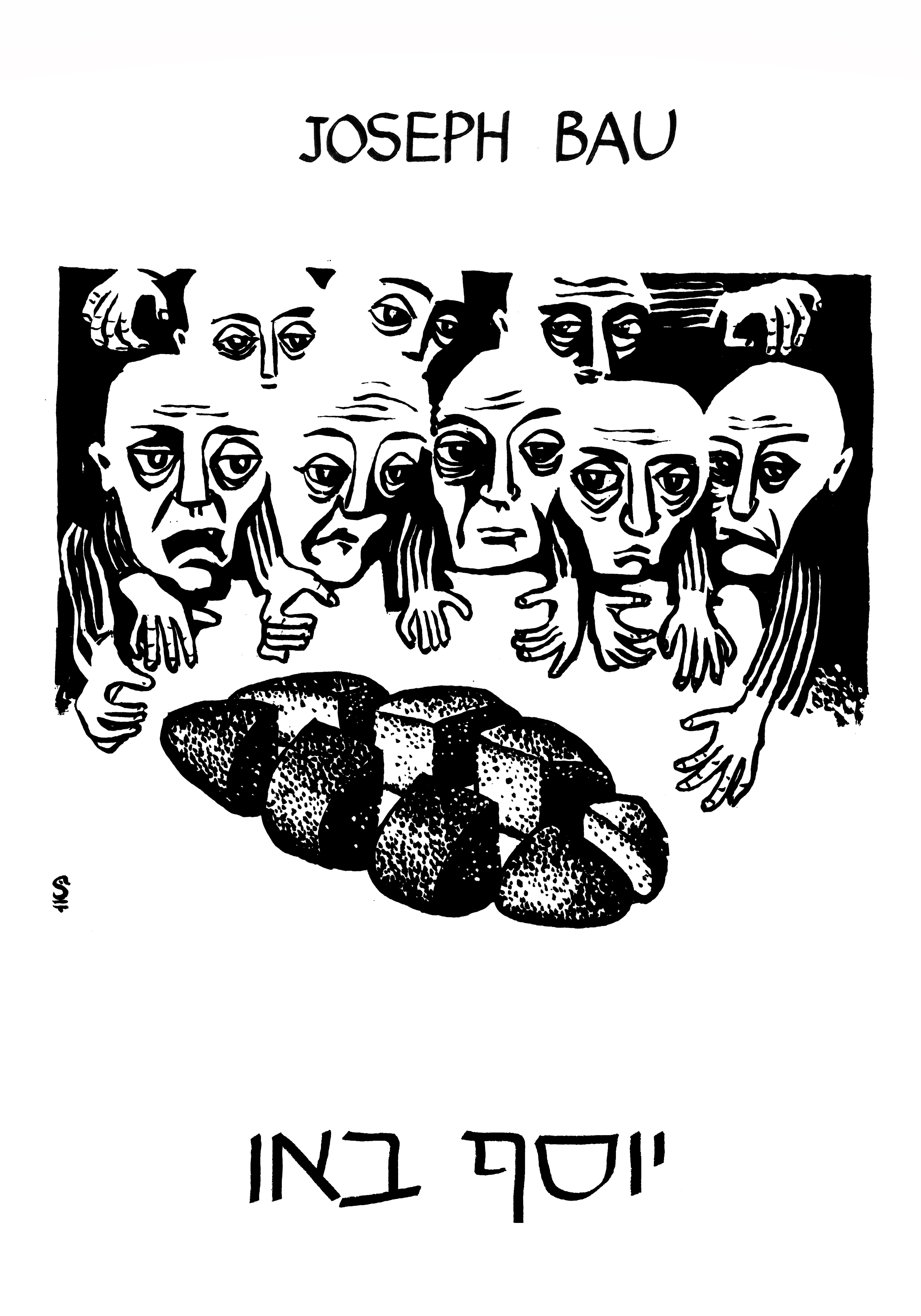
We loved that the film also included the special humorous playing cards that our father drew while in the camp which he used to cheer people up and encourage them, saving their lives.
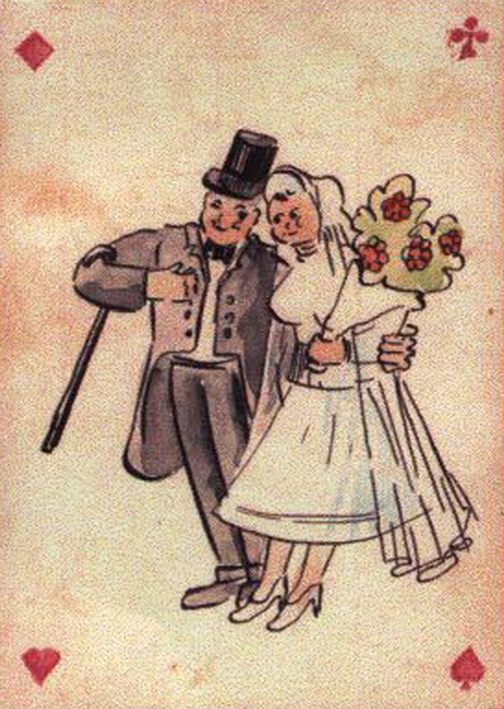
SZ: What was your role in the film?
CV and HB: We first met Deborah Smerecnik, the writer and producer of the film over fifteen years ago when she visited us at the Joseph Bau Museum in Tel Aviv. She was mesmerized by our parents’ love story and invited us to her home to learn more about their lives. For days we shared numerous stories about our parents. Many scripts were written but we didn’t like them because there was no humour. Our father was full of humour and we know how important this was for him. He always said when someone talks about me, it must be with humour. All his life his biggest love was people and to help them and save them. All his life he painted people. You can’t portray him without humour. Then Deborah wrote the script herself and this one we felt captured our father’s spirit.
We were not on set, but we were deeply involved behind the scenes as consultants. We worked closely with the filmmakers to ensure the story stayed true to who our parents were. We shared memories, details of their personalities, and family history, and we provided access to our father’s writings, memoir, artwork, and archives. Our role was to help protect the authenticity of the story and to ensure that the love, intelligence, humor, and resilience of our parents were represented.
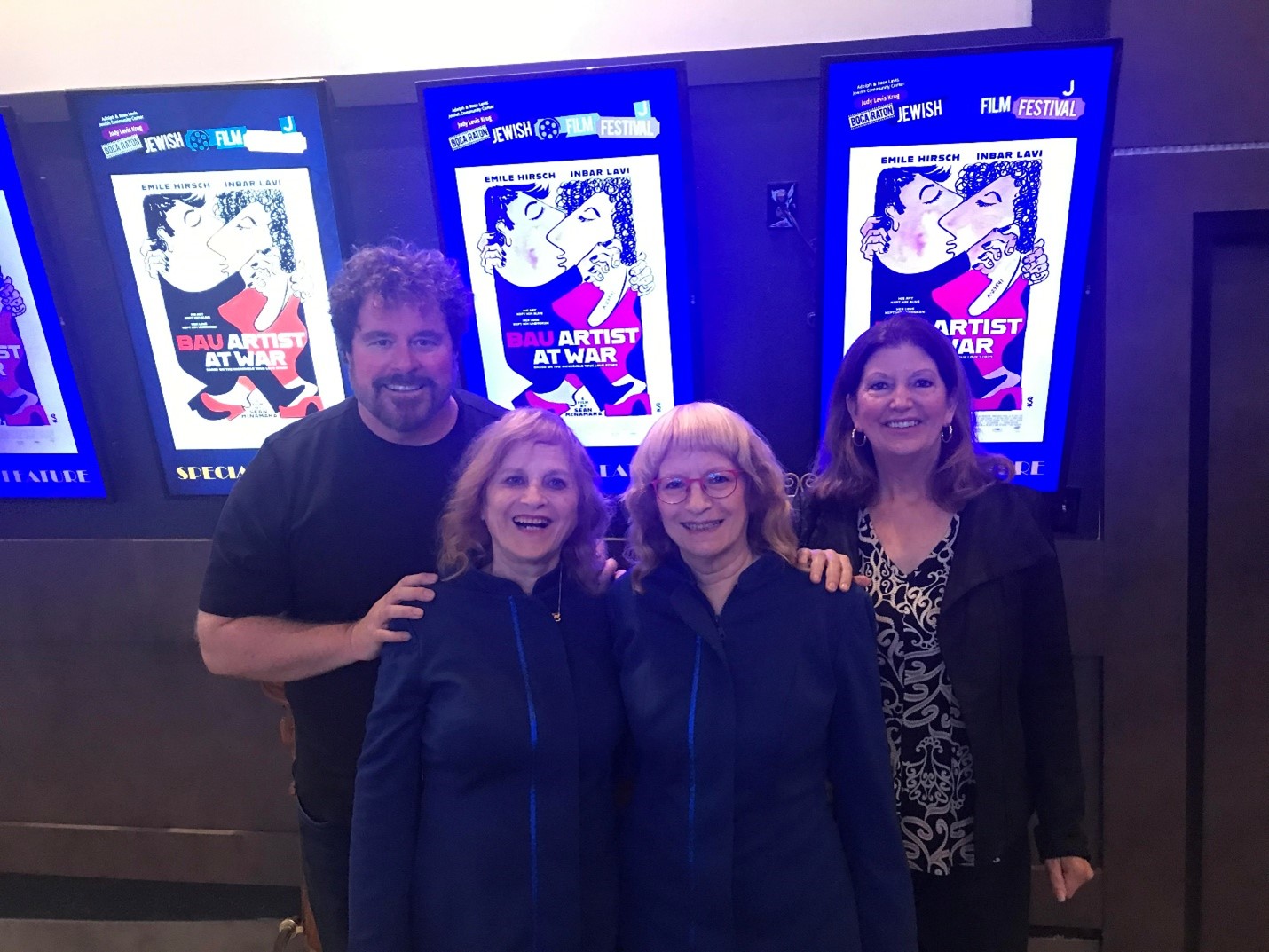
Clila and Hadasa Bau with Director Sean McNamara and Writer/Producer Deborah Smerecnik at a screening of Bau, Artist at War
SZ: Did you have any literary inspiration or other films that influenced your approach or involvement in the adaptation?
CV and HB: Our father’s memoir, originally titled Dear God, Have You Ever Gone Hungry?, and our mother’s memoir In the Name of God! were the basis for the movie. We found our mother’s diaries after she passed away. There she wrote how she saved Jews and how she saved our father in the Holocaust. Our father’s memoir contains not only his harrowing experiences but also his unique humor, poetry, and artistry. He didn’t write even one word about saving people. We learned about it later in life. We wanted the film to capture the same spirit. Of course, Schindler’s List was also an important touchstone, but we hoped this film would add a new dimension — showing how love, creativity, and humour endured even in the darkest times. Our father’s book was republished by Blackstone Publishing this year with the name Bau: Artist at War.

SZ: Director Sean McNamara wrote movingly of his encounter with your father’s work in the introduction to the book Bau: Artist at War. He notes that it is the role of artists to stand up to injustice. Your parents’ dedication to sharing their own stories seems a testament to this. Could you speak a bit about their (and your own) advocacy?
CV and HB: Most people didn’t talk or write about what they went through, but our parents spoke about the Holocaust every day. To talk about what they went through and to return to that period, only superheroes could do that and still live normal lives.
After surviving the Holocaust, they chose not to stay silent. Instead, they opened their tiny studio in Tel Aviv to teach, to inspire, and to remind people of the power of resilience. We continue this mission through the Joseph Bau Museum. For us, advocacy means keeping their voices alive — not only to honor them, but also to fight antisemitism and injustice in today’s world. Director Sean McNamara says: “Joseph Bau’s story reminds us that love, creativity and courage can overcome even the worst darkness. It’s a message we all need — now more than ever. We must never forget.” We believe, as our parents did, that memory and art are powerful tools for building a better future.
SZ: Humor, love, and resilience comes up again and again when referencing your parents. How do love and humor work to counteract the often-overwhelming darkness of the Holocaust?
CV and HB: First of all not many had humor and not many fell in love in the camps. Our parents were the only couple that dared to get married inside a concentration camp. They risked their lives. The fact that they married in a concentration camp shows how powerful love can be — it gave them and the people around them hope for tomorrow when there seemed to be no tomorrow. Humor and love together created a shield against the darkness.
Humor was their survival mechanism. In the darkest places, laughter gave them back a sense of humanity, if only for a moment. Our father used jokes, drawings, and wordplay as a way to push back against despair. Love was equally important.
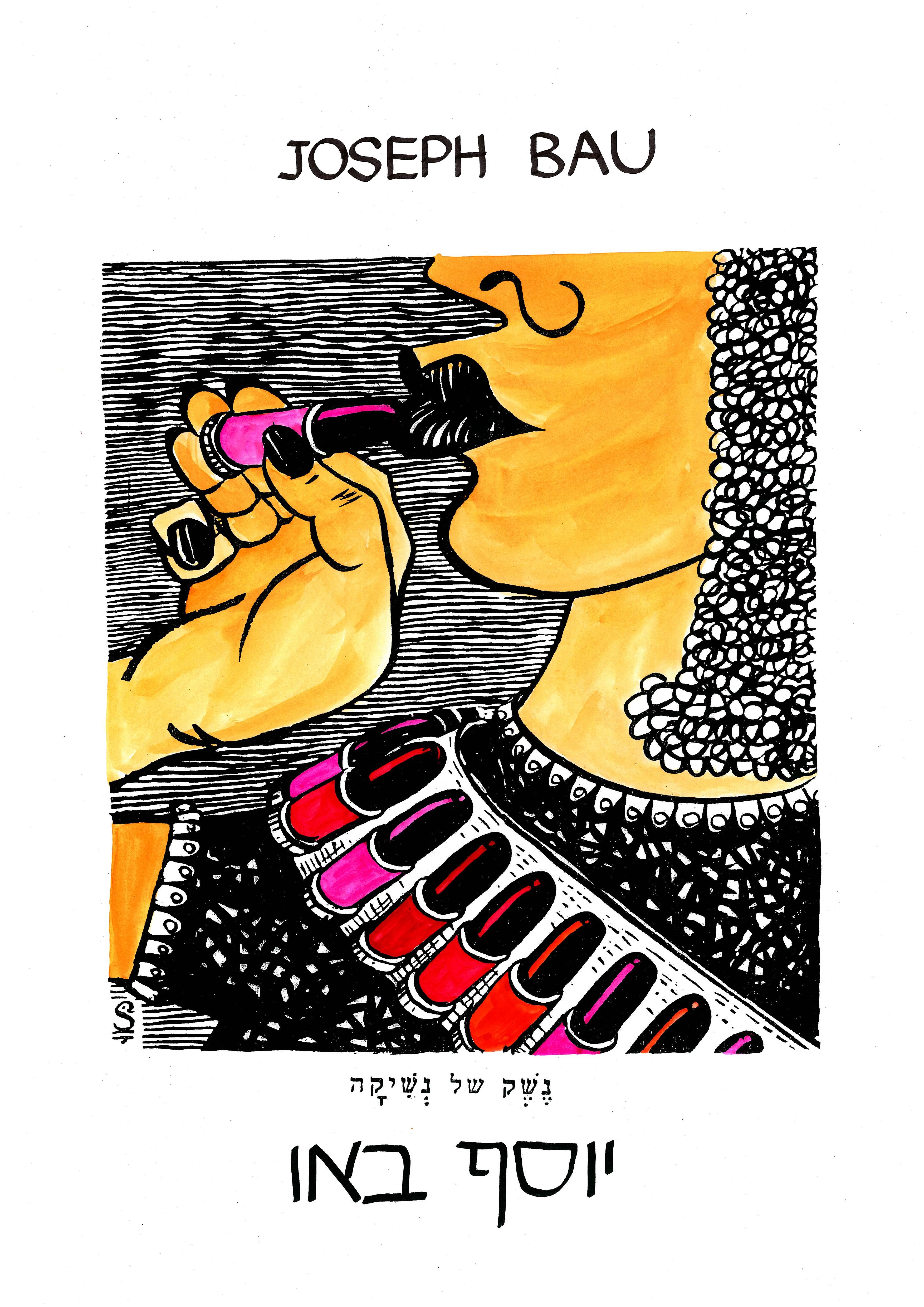
SZ: Could you speak a bit about The Joseph Bau Museum in Israel?
CV and HB: Joseph Bau was a Holocaust survivor, Oskar Schindler’s forger, and a hero of the Kraków Ghetto, Płaszów concentration camp, and Brünnlitz labor camp (Schindler’s camp). After the war, he became Israel’s first animator and a beloved cultural figure. He was the first animator in Israel who also built all his equipment by himself, including the smallest movie theatre. He designed many fonts for Israeli movies. He researched the Hebrew language, and he is the only artist in the world who painted the Hebrew language in humor. Our father established his Tel Aviv art studio in 1960 and actually transformed the studio into a mini-museum before he passed in 2002. For over twenty years, we have brought his legacy to life through storytelling, song, and education. The museum has become a sanctuary of light, humor, and strength. For years, it has been ranked as the number one attraction in Tel Aviv and among the top 1% of global attractions on TripAdvisor. Sadly, the building has been sold and faces demolition. We are now fighting to save the museum and relocate it so that our father’s legacy and our parents’ love story will continue to inspire the world.
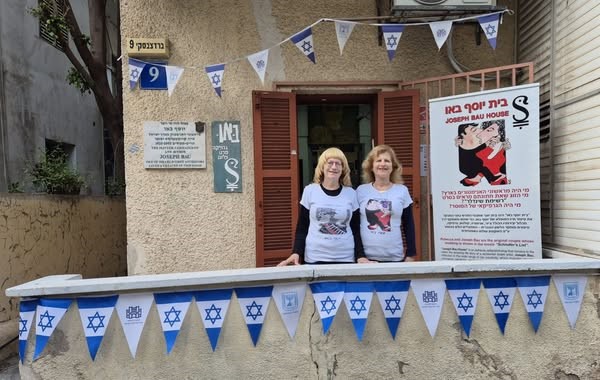
SZ: Have you had any reactions from the film yet?
CV and HB: Yes, the reactions have been incredible. Throughout the movie you hear people laugh, cry, and clap their hands. When the movie ended, people stayed sitting and wanted to hear more. Many are amazed to discover the love story behind our parents’ survival, and how art and humor could flourish even in the shadow of death. Younger audiences, especially, have said the film made history feel alive and relevant in a way books alone sometimes cannot. For us, the most meaningful reactions are when people say: “Your parents’ story changed the way I see the world.” That is exactly what we hoped for.
SZ: Is there anything else you would like to share with Jewish Book Council readers?
CV and HB: We hope that the Jewish Book Council readers will join us in our efforts to help save The Joseph Bau Museum and preserve our parents’ legacy of courage, humor, and hope. The museum is a testament to resilience, art, and the triumph of the human spirit. You can visit our CauseMatch campaign to learn more and support this effort. You can also explore our father’s art, experience a virtual tour of the museum, and sign up for our newsletter via our Linktree. Together, we can ensure that Joseph and Rebecca Bau’s story continues to inspire future generations.
Simona is the Jewish Book Council’s manager of digital content strategy. She graduated from Sarah Lawrence College with a concentration in English and History and studied abroad in India and England. Prior to the JBC she worked at Oxford University Press. Her writing has been featured in Lilith, The Normal School, Digging through the Fat, and other publications. She holds an MFA in fiction from The New School.